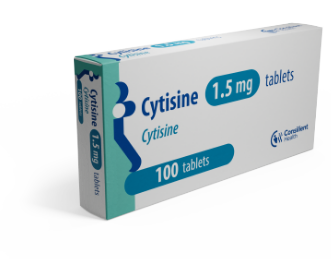How to take Cytisine
How to take Cytisine
If you have any questions about your prescription or the information in the Patient Information Leaflet, please speak to your healthcare professional.
What CYTISINE is and what it is used for?
Smoking cessation and reduction of nicotine cravings in smokers who are willing to stop smoking. The treatment goal of CYTISINE is the permanent cessation of the nicotine‑containing products use.
CYTISINE is supplied in a packet of 100 tablets and one packet of CYTISINE is sufficient for a complete 25-day course of therapy.
The use of CYTISINE allows for a gradual reduction of nicotine dependence by relieving withdrawal symptoms.

-
CYTISINE should be taken as per the recommendations below (unless you have been advised differently by a healthcare professional):
-
• Days 1–3
1 tablet every 2 hours
- 6 tablets max per day
-
• Days 4–12
1 tablet every 2.5 hours -
5 tablets max per day
Smoking should be stopped no later than on the 5th day of treatment.Smoking should not be continued during treatment as this may aggravate adverse reactions.
-
• Days 13–16
1 tablet every 3 hours
- 4 tablets max per day
-
• Days 17–20
1 tablet every 5 hours
- 3 tablets max per day
-
• Days 21–25
1–2 tablets a day
- 2 tablets max per day
-
YOUR CYTISINE DOSAGE SCHEDULE
To make life as easy as possible when commencing your course of CYTISINE, you may want to download this dosing calendar, so that you can keep a track of every tablet you take throughout each of the 25 days of treatment.
What you need to know before
you use Cytisine
- if you are allergic to cytisine or any of the other ingredients of this medicine (see leaflet provided in the pack)
- if you have unstable angina,
- if you have a history of recent myocardial infarction
- if you have clinically significant cardiac arrhythmias,
- if you had stroke recently,
- if you are pregnant or breast-feeding.
Tell your doctor or pharmacist if you are using, have recently used or might use any other medicines as the effects of changes in your body resulting from stopping smoking, with or without treatment with CYTISINE, may alter the way other medicines act. If you are not sure, talk to your doctor or pharmacist.
For some people, stopping smoking with or without treatment has been associated with an increased risk of experiencing changes in thinking or behaviour, feelings of depression and anxiety (rarely including suicidal ideation and suicide attempt) and can be associated with a worsening of psychiatric disorder. If you have a history of psychiatric disorder you should discuss this with your doctor.
Potential side effects
with Cytisine
These side effects may occur with certain frequencies, which are defined as follows:
change in appetite (mainly increase), weight gain, dizziness, irritability, mood changes, anxiety, increased blood pressure (hypertension), dry mouth, diarrhoea, rash, fatigue, sleep disorders (insomnia, drowsiness, lethargy, abnormal dreams, nightmares), headaches, increased heart rate, nausea, flavour changes, heartburn, constipation, vomiting, abdominal pain (especially in the upper abdomen), muscle pain.
difficulty in concentration, slow heart rate, abdominal distension, burning tongue, malaise.
feeling of heaviness in the head, decreased libido, tearing, dyspnea, increased sputum, excessive salivation, sweating, decreased elasticity of the skin, tiredness, increase in serum transaminase levels.
Most of above side effects occur at the beginning of the therapy and resolve along with its duration. These symptoms could also be the result of smoking cessation (withdrawal symptoms), not treatment with CYTISINE.- Cytisine Summary of Product Characteristics, Consilient Health 2023.
Reporting of side effects.
If you develop any side effects (adverse events) while taking a Consilient Health medicine, please talk to your doctor, pharmacist, or nurse.
This includes any possible side effects not listed in the package leaflet.You can also report side effects directly via the Yellow Card Scheme at https://yellowcard.mhra.gov.uk/.
By reporting side effects you help provide more information on the safety of our medicines.
This site is intended for
Healthcare Professionals registered in the UK.
By clicking CONTINUE you are confirming that you are a
Healthcare Professional registered in the UK.
Date of preparation January 2024 UK-CYT-101
You are now leaving this webpage. Any information derived from an external link is not owned by Consilient Health and is not subject to any Consilient Health policy.
This link does not constitute endorsement by Consilient Health.
Do you wish to continue?
Date of preparation March 2024 UK-CYT-114